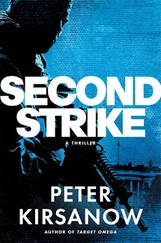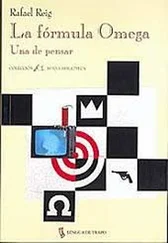Olivia was riding in the back of one of DGT’s seemingly endless supply of black SUVs. Two armed, black-uniformed DGT security guards were in front. Carl was seated to her right. And, as usual, whenever he was around Olivia, he was smiling. The vehicle in which she rode was sandwiched between identical lead and trailing SUVs, each carrying a quartet of DGT security guards armed with MP7s. As Carl had been told by Dwyer, he’d be damned if anything happened to the NSA’s aide on DGT’s watch. The only threat Olivia could discern, however, was the impenetrable traffic approaching the Beltway. It was nearly at a standstill.
Olivia was on her way to meet Brandt to assess the information provided by Garin. According to Brandt, confusion had reigned in the Situation Room a short time ago. Brandt had succeeded in buying some time before the president decided on a course of action. Olivia was unsure what good would come from the extra time. She hadn’t gotten any new information from Garin about the EMP strike and doubted she would. Garin had been clear about the message he’d received from Singer. The EMP strike was going to be on the United States. Israel hadn’t been mentioned. From Olivia’s perspective, there was little more to analyze. The president needed to understand that the nation he led was the target.
The only questions were, when would the attack occur and from where would it come? Olivia had struggled with those questions from the moment Garin had told her about the EMP. She shared Brandt’s conclusion that under ordinary circumstances the Russians wouldn’t risk doing it for fear of annihilation. The same rationale applied to every other country with nuclear capability, and those countries didn’t have agents running around America killing US special operators.
Olivia decided that without additional information she’d be wasting Brandt’s time, causing both of them to waste the president’s time. And despite her whiz-kid reputation, Olivia couldn’t shake the fear that she was out of her depth. If Garin’s information was correct, the United States was facing a titanic calamity, and Olivia was part of the team tasked to prevent it. A far cry from grading undergrad term papers at Stanford.
At least Jim had forestalled the president from taking precipitous, potentially catastrophic action. She decided to call Dan Dwyer and ask whether he could put her in touch with Garin. Maybe he had gotten some new information. Or maybe he had some ideas that Brandt and Olivia hadn’t considered. She desperately hoped he did.
—
Brandt sat in the Situation Room as the president and his chief of staff huddled in a far corner in advance of the president’s call to President Mikhailov. Marshall had asked Brandt to remain behind after the meeting had ended. A Russian translator, who had introduced himself as Josh Plotkin, sat opposite Brandt. Mikhailov spoke English fairly well, but Brandt had advised the president that given the stakes, even the slightest misunderstandings couldn’t be risked. Plotkin, a tall, owlish Princeton summa cum laude in his late twenties, was to keep silent, acting only as a backstop.
The call to the Russian president would be placed in five minutes, the White House Communications Agency having contacted the Kremlin within the last twenty-five minutes to alert the Russians of Marshall’s need to speak with Mikhailov on a matter of urgency, a matter that could involve military action. It was late night in Moscow and it was estimated that Mikhailov would need some time to summon whatever advisors he needed to participate in the call.
Aside from Plotkin, Marshall had chosen to have only Brandt and Cho join him, causing no small amount of distress to the secretary of state, who offered to stay to provide whatever advice and counsel the president might require. Marshall politely declined. The last thing he needed in the room was the distraction of Ted Lawrence jockeying with Brandt for influence. Plus, the president trusted Brandt’s sober reasoning. Substance, not political posturing, was what was needed at this moment.
The voice of Major Clayton Cord, detailed to the White House Communications Agency, came over the speaker in the Situation Room. “Mr. President, President Mikhailov will be on the line in sixty seconds. We’re told he will be joined by a senior aide and a translator.”
“Thank you, Major,” Marshall replied as he took his seat. Cho sat to his left and Plotkin moved to his seat at the president’s right. Brandt sat to Cho’s left.
Brandt’s calm demeanor belied a twinge of anxiety. To this point, his involvement in critical issues had always been confined to the background. The importance of this moment eclipsed anything he’d ever done before. He was seated at the table with the president of the United States, about to talk to the president of Russia. The two commanded the largest nuclear arsenals in the world, enough firepower to extinguish the lives of every human being on the planet. The thought, while producing a bit of nervousness, also sharpened his focus.
There was a click and the gravelly yet urbane voice of the Russian president materialized. “Mr. President?”
“Yes, Yuri,” replied Marshall, leaning toward the speaker. “Thank you for making yourself available on such short notice and at such a late hour. I have in the room with me my chief of staff, Iris Cho, and national security advisor, James Brandt. Joshua Plotkin is also present as translator, but I doubt we’ll need his services.”
“Good evening, Ms. Cho. It was good to meet you at the G20 summit last month. I would like to continue our discussion of insufferable Parisian sommeliers, but given the hour, I gather the purpose of the call is not to exchange pleasantries. I’ve not had the pleasure of meeting with Mr. Brandt or Mr. Plotkin, but I, of course, have read a number of Mr. Brandt’s papers. Impressive. With me are my senior aide Alexei Vasiliev and a translator. I would greatly prefer to videoconference, but, as you might imagine, at this hour, I am not quite presentable.”
“Yuri, as you’ve surmised, I would not have roused you in the middle of the night unless it pertained to a matter of some significance.”
Brandt made a downward motion with his hand, reminding Marshall to modulate his tone and not be unduly inflammatory. Marshall nodded absentmindedly.
“We have detected a large number of your submarines very near our coast. We estimate eight Akula class, four Delta IVs, and possibly a Borei. If I recall correctly, the Delta IVs are equipped with sixteen ballistic missiles with four to six MIRVed warheads.” The clinical manner in which Marshall spoke gave the statement a heightened impact.
There was a short pause at the end of the line followed by unintelligible conversation.
“John Allen,” Mikhailov said, “I do not quite understand. You stated that this was a matter of significance, but you know quite well that for the last fifty years both your country and mine have engaged in maneuvers off of our respective coastlines. It is the norm, not the exception. As tiresome as it may be, it is, in fact, expected. Therefore, I must conclude that this is not the primary thing on your mind. Am I correct?”
“You are correct, Yuri.”
There was more unintelligible conversation on the other side. Brandt realized that the Russian president’s words with his aide were being electronically scrambled. Brandt didn’t know whether any sidebars between himself and Marshall would also be automatically muted or scrambled, so he remained silent.
“John Allen, I’m reliably informed that any Russian submarines that may have been in the vicinity of the North American coastline have since moved well into the Atlantic. I’m sure you can verify this.”
Читать дальше












